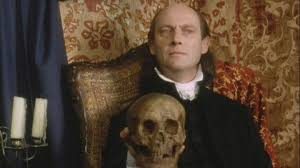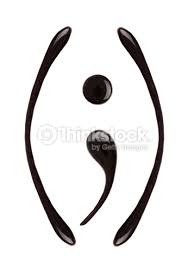Somebody put a drop of his blood under a magnifying-glass, and it was all semicolons and parentheses. George Eliot, Middlemarch
My sons have never thought that I look like a philosopher. This has been an issue for more than twenty-five years, ever since the late summer of 1988 when they arrived with Jeanne and me in Milwaukee, where I began my PhD studies at Marquette University. They were nine and six at the time—I’m pretty sure they didn’t know what doctoral studies amounted to, but I told them that when I was done they would forevermore have to call me  “Doctor Dad” and that we would be getting a license plate that read DRDAD. Neither of those things happened, but they gradually got the idea that this was important. After meeting some of my fellow students and some of my professors, they began to form an image of what “Doctor Dad” should look like. And it wasn’t me.
“Doctor Dad” and that we would be getting a license plate that read DRDAD. Neither of those things happened, but they gradually got the idea that this was important. After meeting some of my fellow students and some of my professors, they began to form an image of what “Doctor Dad” should look like. And it wasn’t me.
I never was clear about exactly in what ways I failed to live up to my sons’ imaginary philosopher until several years later. I was in my first two or three years of teaching at Providence College, where I will be starting year twenty-three in the fall. The college is set smack in the middle of a well-established residential area, and a number of the faculty (including me) live within a few blocks of campus. One day my youngest son Justin and I were driving down an avenue that forms the whole south border of campus from end to end; many faculty and student dwellings are located on the parallel streets that run away from campus off this avenue. On the opposite sidewalk Justin spotted one of my colleagues from the philosophy department who lived in the area— it was a breezy day and my colleague’s almost-shoulder-length hair was blowing wildly, as was his unbuttoned trench coat as he leaned into the wind. Papers were falling out of the briefcase clamped under his right arm, and he was gesticulating with his left arm and hand as he apparently tried to make an important point. To himself. Out loud. My colleague was akin to Voltaire’s God—if the philosophy department didn’t have him, we would have had to invent him. “Now that’s what a REAL philosopher looks like,” Justin commented. So now I knew.
it was a breezy day and my colleague’s almost-shoulder-length hair was blowing wildly, as was his unbuttoned trench coat as he leaned into the wind. Papers were falling out of the briefcase clamped under his right arm, and he was gesticulating with his left arm and hand as he apparently tried to make an important point. To himself. Out loud. My colleague was akin to Voltaire’s God—if the philosophy department didn’t have him, we would have had to invent him. “Now that’s what a REAL philosopher looks like,” Justin commented. So now I knew.
I’ve inhabited the philosophy professor stereotype sufficiently over the succeeding years that no one is particularly surprised to find out that I am a college professor when we meet for the first time; knowing that, they are even less surprised to learn that I teach philosophy. In what other profession could a sixty-year-old guy sport a gray ponytail, dress as I generally do, and not get fired? There is a certain amount of truth at the root of every stereotype, including that academics look, act, and talk in identifiable ways—ways that normal human beings can’t get away with (and wouldn’t want to).  Over the last couple of weeks, I’ve enjoyed returning to my favorite novel and rediscovering one of the great academics in all of literature—and I’m getting to do it with a bunch of academics.
Over the last couple of weeks, I’ve enjoyed returning to my favorite novel and rediscovering one of the great academics in all of literature—and I’m getting to do it with a bunch of academics.
I have a colleague in the philosophy department who started a reading group a few years ago. I’m not a big fan of reading groups, but gave one of his early ones—War and Peace a few summers ago—a shot. Although I read the whole novel (first time since undergraduate days), I made it through only two reading group meetings—just not my cup of tea. A few years have passed since then; although I receive notice each semester and summer of the new reading group text, I always send it to the e-circular file. Until now. My colleague, who is an occasional reader of my blog, knew from a couple of entries that this summer’s reading group choice is my favorite novel. “Middlemarch, Vance!” he said at the copier the other in a seductive tone. “George Eliot! Middlemarch!” And it worked. I’m still technically on sabbatical, I just finished my current book—why not?
The assignment for the reading group’s first meeting last week was the opening six chapters, around 60-70 pages. In those early pages we meet Dorothea Brooke, the heroine of the novel, and her sister Celia. Both are in their late teens (Dorothea is a year or two older) and are the wards of their uncle due to the death of their parents several years earlier. Dorothea is idealistic, is already inwardly rebelling against the limited opportunities available to an intelligent young woman in 1820s rural England, and is seeking to make a difference in the world (in the Prologue, Eliot likens her to a young Saint Teresa). A young man with money, land, and aristocratic blood is courting Dorothea, but she is so uninterested and oblivious that she assumes the man is courting her sister Celia.  And then one day something extraordinary happens. Mr. Brooke invites Mr. Casaubon to dinner.
And then one day something extraordinary happens. Mr. Brooke invites Mr. Casaubon to dinner.
Mr. Casaubon is the county intellectual. He is a Church of England minister with money, land, and the best education available, high enough on the clerical pecking order that the only thing he has to do for his parish on a weekly basis is give the sermon. Mr. Casaubon dresses in black from head to toe, has steel gray hair, is at least twenty-five years older than Dorothea, and is the stereotypical academic through and through. Dorothea and Celia agree that Mr. Casaubon is the spitting image of the great seventeenth-century philosopher John Locke—as if that’s a good thing.  His magnum opus is to be titled “The Key to All Mythologies,” in which he intends to show “that all the mythical systems or erratic mythical fragments in the world were corruptions of a tradition originally revealed.” Not a word of this masterpiece-to-be has actually been written, but Casaubon has been researching it for more than twenty years.
His magnum opus is to be titled “The Key to All Mythologies,” in which he intends to show “that all the mythical systems or erratic mythical fragments in the world were corruptions of a tradition originally revealed.” Not a word of this masterpiece-to-be has actually been written, but Casaubon has been researching it for more than twenty years.  His musty library, indeed his whole musty estate, is filled with papers, books, and dozens of notebooks that he hopes to turn into a finished product that will “fill a small shelf.” Everyone in town and the surrounding county agree that Casaubon’s intellect is god-like and are willing to bemusedly accept his strangeness—because he’s an academic.
His musty library, indeed his whole musty estate, is filled with papers, books, and dozens of notebooks that he hopes to turn into a finished product that will “fill a small shelf.” Everyone in town and the surrounding county agree that Casaubon’s intellect is god-like and are willing to bemusedly accept his strangeness—because he’s an academic.
Against all odds, Dorothea is smitten by Mr. Casaubon. She has been looking for her life’s purpose—it has been revealed in the form of being the needed partner who will help bring Mr. Casaubon’s life work to fruition. Nobody can believe that Dorothea prefers this guy to other suitors—including Mr. Casaubon. But as the prospect of not spending his remaining years alone grows on him a bit, he opens the door to his long-neglected feelings a crack. The first returns are not encouraging;  Eliot tells us that “he determined to abandon himself to the stream of feeling, and perhaps was surprised to find what an exceedingly shallow rill it was.” But hey, give him a chance! This is new territory for an academic.
Eliot tells us that “he determined to abandon himself to the stream of feeling, and perhaps was surprised to find what an exceedingly shallow rill it was.” But hey, give him a chance! This is new territory for an academic.
Once Mr. Casaubon has proposed to Dorothea in one of the most painfully god-awful letters of proposal ever, and Dorothea has accepted his offer, this peculiar match is the talk of the town. Mrs. Cadwallader, the wife of one of the local curates, summarizes everyone’s concerns about the upcoming marriage.
He’s got no good red blood in his body. Somebody put a drop under a magnifying-glass, and it was all semicolons and parentheses . . .  He dreams footnotes, and they run away with all his brains. They say, when he was a little boy, he made an abstract of ‘Hop o’ my Thumb,’ and he’s been making abstracts ever since.
He dreams footnotes, and they run away with all his brains. They say, when he was a little boy, he made an abstract of ‘Hop o’ my Thumb,’ and he’s been making abstracts ever since.
They do get married, and as they used to say in ads for sixties and seventies sitcoms, “hijinks ensue.” Hijinks of the sort that only an academic could encounter, that is; the sort of hijinks that only semicolons and parentheses provide access to.
As we went around the seminar table introducing ourselves at the first reading group meeting, my turn came last. I noted that I love Victorian fiction, and that Middlemarch is not only my favorite Victorian novel, but my favorite novel—period. “And I’m particularly looking forward to doing this with other professors,’ I continued, “because each of us knows a Mr. Casaubon.” There are thirteen members in the reading group, faculty from ten different departments ranging from philosophy and history to marketing and chemistry. Everyone nodded knowingly as they envisioned their personal Mr. Casaubon. I understand that some readers of Middlemarch consider Mr. Casaubon to be a somewhat over the top caricature, but those of us sitting around the table knew better. He lives among us—each academic on her or his worst day is Mr. Casaubon. As a former colleague and mentor commented once concerning the life of academe, “it’s a good thing that colleges and universities exist; what else would they do with us?”












